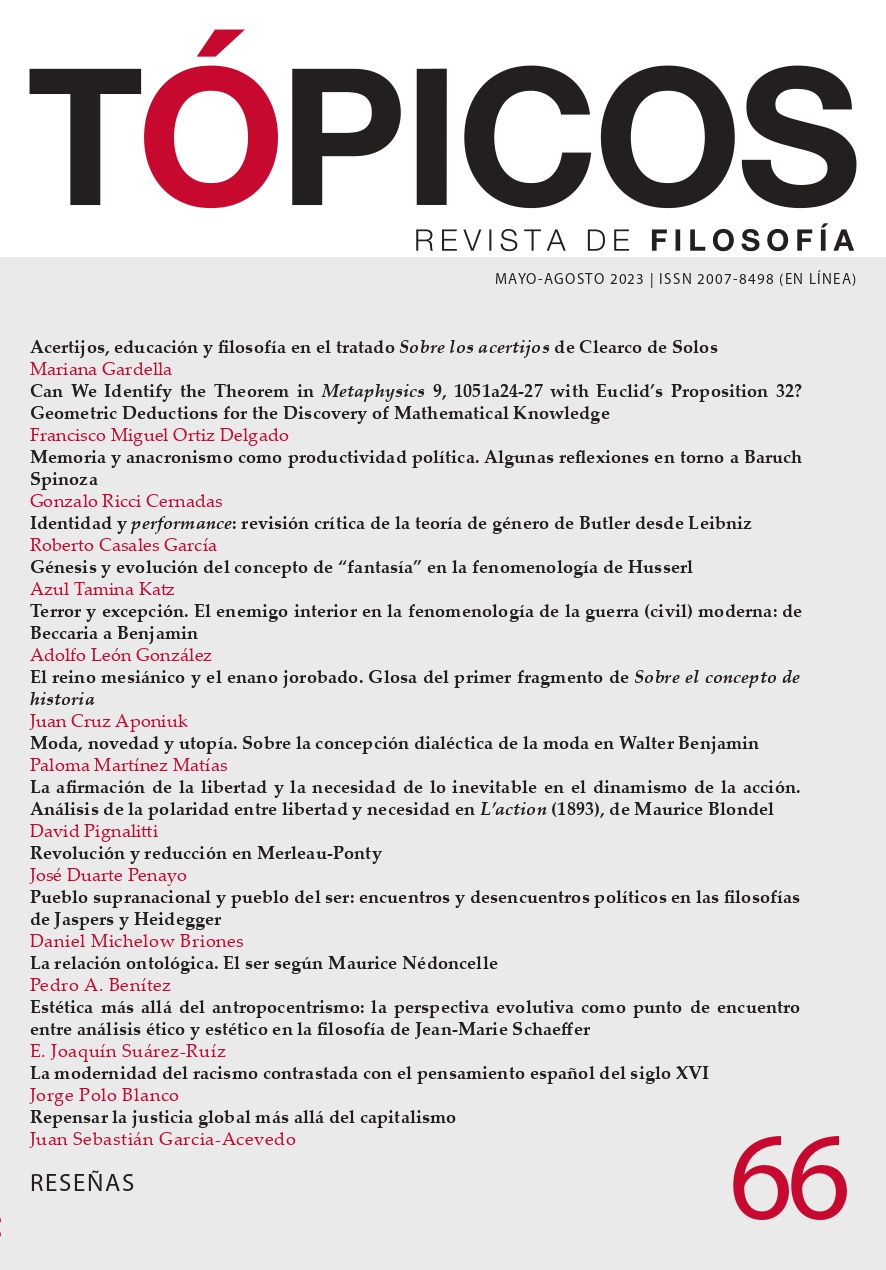Fashion, Novelty, and Utopia: On Walter Benjamin’s Dialectical Conception of Fashion
Published 2023-04-11
How to Cite
Copyright (c) 2023 Tópicos, Revista de Filosofía

This work is licensed under a Creative Commons Attribution-NonCommercial-NoDerivatives 4.0 International License.
Downloads
Altmetrics
Citas
Abstract
The purpose of this essay is to study Walter Benjamin’s reflections on the phenomenon of fashion in the Arcades Project in order to clarify the dialectical nature that he observes in it. To this end, it first examines the important role of fashion, thanks to its valorisation of novelty, in the tendency of capitalism towards the commodification of all things and in the development of the commodity cult. In connection with these aspects, it is analysed how this social phenomenon contributes to the emergence of the view of history distinctive of capitalist society, linked to an ideal of progress that masks its social statism. Finally, an interpretation is offered of the political significance that Benjamin attaches to fashion both in terms of its relation to the task of the materialist historian and the utopian side that this phenomenon would include.
References
- Adorno, T. y Benjamin, W. (1995). Briefwechsel. 1928-1940. Suhrkamp.
- Agesta, M. N. (2011). Memorias de un tiempo recobrado. Teoría de la historia y crítica al progreso en la obra de Walter Benjamin. Historiografías, 2, 8-28.
- Apel, F. (2000). Die Kurtisane kitzelt den Tod. Mode als Revers der Melancholie bei Walter Benjamin. Figurationen 2, pp. 79-91.
- Belforte, M. (2016). Política de la embriaguez. Infancia, amor y muerte en el proyecto político de Walter Benjamin. Facultad de Filosofía y Letras [de la Universidad de Buenos Aires].
- Benjamin, A. (2003). Being Roman Now: The Time of Fashion: A Commentary on Walter Benjamin’s ‘Theses on the Philosophy of History’ XIV. Thesis Eleven, 75, 39-53.
- Benjamin, W. (1991a). [GS V]. Das Passagen-Werk. Gesammelte Schriften. Band V. R. Tiedemann (ed.). Suhrkamp.
- Benjamin, W. (1991b). [GS II]. Der Sürrealismus. Die letzte Momentaufnahme der europäische Intelligenz. En Gesammelte Schriften. Band II-1. (pp. 295-310). R. Tiedemann y H. Schweppenhäuser (eds.). Suhrkamp.
- Benjamin, W. (1991c). [GS I]. Über den Begriff der Geschichte. En Gesammelte Schriften. Band I-2. (pp. 691-704). R. Tiedemann y H. Schweppenhäuser (eds.). Suhrkamp.
- Bretas, A. (2013). The Eternal Return of the New. The Aesthetics of Fashion in Walter Benjamin. Pro-ceedings of the European Society for Aesthetics, 5, 150-162.
- Buck-Morss, S. (1986). The Flaneur, the Sandwichman and the Whore: The Politics of Loitering. New German Critique, 39, 99-140.
- Buck-Morss, S. (2001). Dialéctica de la mirada. Walter Benjamin y el proyecto de los Pasajes. N. Rabotnikof (trad.). Editorial Antonio Machado.
- Buck-Morss, S. (2014). Walter Benjamin, escritor revolucionario. M. López Seoane (trad.). La marca editora.
- Ekardt, P. (2020). Benjamin on Fashion. Bloomsbury.
- Frisby, D. (2013). Fragments of Modernity. Theories of Modernity in the Work of Simmel, Kracauer, and Benjamin. Routledge.
- Korsch, K. (1972). Marxismus und Philosophie. Europäische Verlagsanstalt.
- Lehmann, U. (2000). Tigersprung. Wie man Geschichte bekleidet. Kritische Berichte, 4, 6-25.
- Löwy, M. (2003). Walter Benjamin: aviso de incendio. Una lectura de las tesis “Sobre el concepto de histo-ria”. H. Pons (trad.). FCE.
- Martínez Matías, P. (2021). Fantasmagoría y despertar. Una aproximación al Libro de los pasajes de Walter Benjamin. Logos. Anales del Seminario de Metafísica, 54(1), 107-129.
- Marx, K. (1972). [MEW 23]. Das Kapital. Kritik der politischen Ökonomie. Buch I: Der Produktionsprozeβ des Kapitals. K. Marx y F. Engels, Werke. Band 23. Dietz.
- Marx, K. (1981). [MEW 1]. Briefe aus den “Deutsch-Französischen Jahrbüchern”. En K. Marx y F. En-gels, Werke. Band 1. (pp. 337-346). Dietz.
- Mate, R. (2006). Medianoche en la historia. Comentarios a las tesis de Walter Benjamín “Sobre el concepto de historia”. Trotta.
- Osborne, P. (1994). Small-scale Victories, Large-scale Defeats. Walter Benjamin’s Politics of Time. En A. Benjamin y P. Osborne (eds.), Walter Benjamin’s Philosophy. Destruction and experience. (pp. 59-109). Routledge.
- Scholem, G. (2007). Walter Benjamin. Historia de una amistad. J. F. Ivars y V. Jarque (trads.). Penguin.
- Simmel, G. (1911). Die Mode. En G. Simmel, Philosophische Kultur. Gesammelte Essais. (pp. 29-64). W. Klinkhardt.
- Wolin, R. (1981). From Messianism to Materialism: The Later Aesthetics of Walter Benjamin. New German Critique, 22, 81-108.
- Wollen, P. (2003). The Concept of Fashion in The Arcades Project. Boundary 2, 30(1), 131-142.





